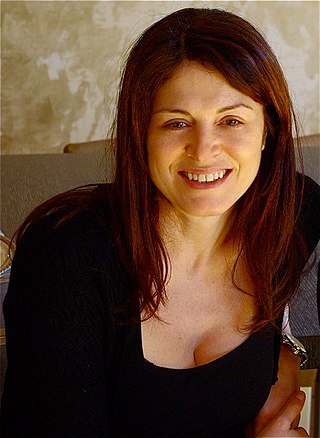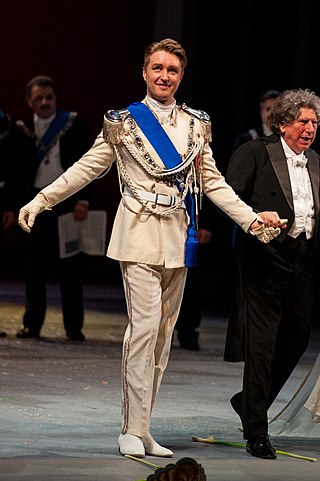The German Fach system is a method of classifying singers, primarily opera singers, according to the range, weight, and color of their voices. It is used worldwide, but primarily in Europe, especially in German-speaking countries and by repertory opera houses.

Luis Ernesto Alva y Talledo, better known as Luigi Alva is a Peruvian operatic tenor. A Mozart and Rossini specialist, Alva achieved fame with roles such as Don Ottavio, Count Almaviva and Fenton. He retired from the stage in 1989.

Jeffrey Black is an Australian baritone who has had an active international performance career since the early 1980s. A frequent performer with Opera Australia and the Glyndebourne Festival Opera, he has performed leading role with the Metropolitan Opera, Opéra Bastille, Lyric Opera of Chicago, Bavarian State Opera, and the Royal Opera, Covent Garden among other opera houses. He is particularly known for his portrayals of Guglielmo in Mozart's Così fan tutte, Count Almaviva in Mozart's The Marriage of Figaro, and Figaro in Rossini's The Barber of Seville.

Juan Diego Flórez is a Peruvian operatic tenor, particularly known for his roles in bel canto operas. On June 4, 2007, he received his country's highest decoration, the Knight Grand Cross in the Order of the Sun of Peru.

Ramón Vargas is a Mexican operatic tenor. Since his debut in the early '90s, he has developed to become one of the most acclaimed tenors of the 21st century. Known for his most expressive and agile lyric tenor voice, he is especially successful in the bel canto repertoire.

Cesare Valletti was an Italian operatic tenor, one of the leading tenore di grazia of the postwar era.

José Francisco Araiza Andrade, is a Mexican operatic tenor and lied singer who has sung as soloist in leading concert halls and in leading tenor operatic roles in the major opera houses of Europe and North America during the course of a lengthy career. Born in Mexico City, he studied singing at the Conservatorio Nacional de Música de México and later in Germany, with Mozartian tenor Richard Holm, and lieder interpretation with Erik Werba. He made his operatic debut in 1970 in Mexico City as First Prisoner in Beethoven's Fidelio. Araiza initially came to international prominence singing in Mozart and Rossini operas, but in the 1980s broadened his repertoire to include Italian and French lyric tenor roles and Wagnerian roles such as Lohengrin and Walther von Stolzing. He was made a Kammersänger of the Vienna State Opera in 1988. Now retired from the opera stage, he teaches singing and serves on the juries of several international singing competitions.
Alessandro Corbelli is an Italian baritone opera singer. One of the world's pre-eminent singers specializing in Mozart and Rossini, Corbelli has sung in many major opera houses around the world and won admiration for his elegant singing style and sharp characterizations, especially in comic roles.
Juan Oncina was a Spanish tenor, particularly associated with Rossini and light Donizetti roles, one of the leading tenore di grazia of the 1950s.

Mario Petri was an Italian operatic bass-baritone particularly associated with Mozart and Rossini roles.

Gregory Kunde is an American operatic tenor particularly associated with the French and Italian repertoires.

Anna Caterina Antonacci is an Italian soprano known for roles in the bel canto and Baroque repertories. She performed as a mezzo-soprano for several years, particularly performing the Rossini canon.
Barry Banks is a Grammy Nominated English/American lyric tenor who, after a long association with The Metropolitan Opera and English National Opera, has achieved acclaim as one of finest interpreters of the Italian bel canto repertoire.

Gabor Carelli was a Hungarian classical tenor who had an important career in operas and concerts in North America during the mid-20th century. He was notably committed to the Metropolitan Opera in New York City from 1951 to 1974 where he gave a total of 1,079 performances. Music critic Elizabeth Forbes stated that he had "a lyrical voice, a stylish technique and an aptitude for comedy." In 1964 he joined the faculty of the Manhattan School of Music, where he taught singing and worked as an ensemble instructor until his death in Manhattan at the age of 83.
Frank Lopardo is an American operatic tenor who was born in Brentwood, New York. Early in his career he specialized in the repertoire of Mozart and Rossini and later transitioned to the works of Puccini, Verdi, Donizetti and Bellini.

Maxim Vyacheslavovich Mironov is a Russian tenor, best known for his interpretation of the bel canto repertoire. In 2001, he joined the Helikon Opera Theatre in Moscow, where he made his operatic debut in André Grétry's opera Pierre le Grand. Mironov won the 2nd Prize at the Neue Stimmen international singing competition in Germany in 2003. In Europe Mironov has performed in many opera houses.

Juan Francisco Gatell (born November 28, 1978, in La Plata, Argentina Juan Francisco Gatell is an Argentinian operatic tenor who specialises in the bel canto repertoire.
Stanford Olsen is an American tenor who has had an active international career in operas and concerts since 1983. He has sung with several of the world's leading opera companies, including the Deutsche Oper Berlin, La Scala and the Royal Opera, London. He was a regular performer at the Metropolitan Opera from 1986 until 1997 where he gave more than 160 performances. A specialist in light lyric tenor roles, he excelled in the operas of Mozart, Bellini, Donizetti, and Gioachino Rossini. After retiring from full-time performance in the late 1990s he became a faculty member at the Florida State University's College of Music, where he was Professor of Voice and Lucille P. and Elbert B. Shelfer Eminent Scholar. He joined the faculty at the University of Michigan School of Music, Theatre & Dance in 2012. In 2015 he was appointed Director of the Castleton Festival's Artist Training Seminar. He continues to perform on the concert platform in addition to his teaching and coaching.
Thomas Jamerson is an American baritone who had an active international career as an opera and concert performer from the 1960s through the 1990s. He first drew distinction in the field of opera in 1968 when he recorded the role of Baron Douphol in Giuseppe Verdi's La traviata for RCA with conductor Georges Prêtre, the RCA Italiana Orchestra, and Montserrat Caballé as Violetta and Carlo Bergonzi as Alfredo. In 1969 he portrayed roles in the United States premieres of two operas at the Santa Fe Opera: Der Auserwählte in Arnold Schoenberg's Die Jakobsleiter and Captain of the Royal Guard in Hans Werner Henze's The Bassarids. He was a principal artist with the New York City Opera from 1969 to 1984. In 1971 he notably created the role of Professor Bolental in the world premiere of Gian Carlo Menotti's The Most Important Man. He currently teaches voice on the faculty at the Music Conservatory of Westchester in White Plains, New York.
Opera Columbus is an American professional opera company in Columbus, Ohio, founded in 1981, and is a member of Opera America. OC employs nearly 350 artists and creative professionals annually—vocalists, artisans, stagehands, costumers, and scenic designers—many of whom are members of the Columbus community.












